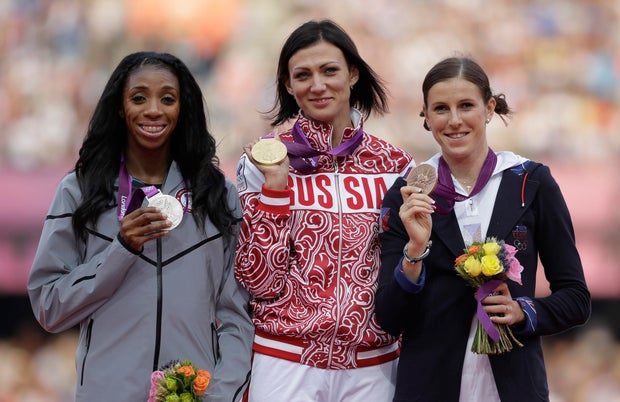There is no way to make up for the Olympic hurdle Lashinda Demus he lost on the day he finished 0.07 seconds behind a Russian opponent who, as everyone later discovered, was doped. What the American 400 meter hurdles champion will finally get is a big day under the Eiffel Tower, where she will be presented with the gold medal she was denied 12 years ago at the London Olympics.
Demus, now 41 and mother of four boys, said so much time had passed that she wasn’t too excited when she learned last year that Natalya Antyukh’s first medal would go to her.
“But one thing I knew was that I was on an international stage,” Demus said. “And whatever happens, I wanted to get that upgrade on the international stage.”
With the help of a lawyer and a determination not to accept the IOC’s first offer – typically a performance at a national or world championship – Demus negotiated a deal to receive the medal on August 9 at the Paris Olympicsin the Parque dos Champions, in the shadow of the Eiffel Tower. This will mark the first time that the IOC will hold a “relocation” ceremony at the Summer Olympics.
Michael Euler/AP
Demus will bring her husband and children on the trip. She created a GoFundMe page to raise money to bring her parents, perhaps her grandmother and other friends and family. On GoFundMe, Demus wrote that the IOC and Olympic authorities “are only able to partially fund this once-in-a-lifetime trip for my family and I” and said donations would be used to pay for “airfare, meals, hotel and Olympic Games.” tickets” in Paris.
Demus said she bore no ill will toward the IOC for the more than a decade it took to get her this medal. But she wanted more than a mere pro forma celebration of the moment. What she really wanted was a ceremony at the athletics stadium, but the IOC said that wasn’t possible. The Eiffel Tower is not a bad backup plan.
“I would have appreciated a little more, I think, glitz and glamor for the people who are getting their medals” belatedly, Demus said. “It’s a work in progress. I’m moving forward in good faith. I’m happy to be at the forefront of this. I can literally say I’m the pioneer of this movement.”
Among those scheduled to receive medals that day will be Zuzana Hejnová of the Czech Republic and Kaliese Spencer of Jamaica, who finished behind Demus in the 400 meters. Also in the group of 10: American high jumper Erik Kynard, who finished second behind another Russian. was discovered to be doping.
Demus estimates she lost seven figures on what she could have earned if she had come home in 2012 as a gold medalist. She battled injuries all season and felt that getting to the start line at the Olympics was a victory of sorts.
When Antyukh overtook her at the finish line by less than half a step, Demus said it crossed her mind that the Russian had never beaten her before.
Matt Slocum/AP
“But it wasn’t in my head that anyone who hit me would automatically become dirty. I didn’t let that infiltrate my thinking,” she said. “I kind of accepted that I lost and tried my best to move on. But it was a five- or six-year process of overcoming failure at something I trained my whole life to do.”
Only when details emerged about a widespread doping scandal in Russia that started in early 2010 Demus began to see his loss in a different light. Even so, it took years for Antyukh to be accused of doping.
After stepping away from the sport for a few years, Demus returned to coaching at Culver City High School near Los Angeles. She works as a clinical researcher for a healthcare company. She has 16-year-old twins and two other children, ages 4 and 5.
She said she’s thrilled to feel like a gold medalist this summer at the Olympics, even though the award comes about 12 years after her race was run.
She also has no illusions that her journey to gold – 400 meters, over 4,384 days – will mark a major turning point in the fight against doping in world sport. Due to doping and, this year, the war in Ukraine, at the last Olympics the Russians will have brought a full track and field team to continue being the same 2012 Games that eventually made Demus an Olympic champion.
“It doesn’t break my heart,” she said. “But what comes to mind is that (doping) will never disappear. I don’t think anything has changed since the big Russian scandal. I believe it will always exist.”
bol co
jogo de terror online
novela sbt ao vivo
wishlist
musica terra seca
taça png
























